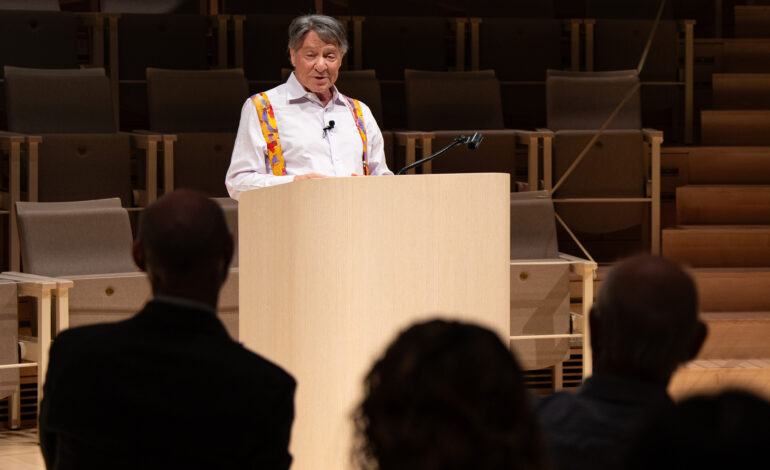Ray Kurzweil Envisions AI’s Role in Future Progress at MIT

Innovator and futurist Ray Kurzweil expressed his vision for the future of artificial intelligence (AI) during a recent lecture at the Massachusetts Institute of Technology (MIT). Accepting the prestigious Robert A. Muh Alumni Award from the School of Humanities, Arts, and Social Sciences (SHASS), Kurzweil highlighted his belief in the accelerating pace of technological progress. He asserted that advancements in AI will bring significant improvements in longevity, healthcare, and various other aspects of life.
Kurzweil delivered his talk, titled “Reinventing Intelligence,” in the newly opened Thomas Tull Concert Hall at MIT, where he shared insights into the future of AI and its integration with human capabilities. He emphasized the importance of recognizing the exponential growth of technology, stating, “People do not appreciate that the rate of progress is accelerating.” He predicted “incredible breakthroughs” in the coming two decades, particularly in the fields of health and medicine.
Agustin Rayo, dean of SHASS, introduced Kurzweil, describing him as “one of the most prolific thinkers of our time.” Rayo praised Kurzweil’s belief that ideas can fundamentally change the world for the better. The Muh Award, established by Robert A. Muh ’59 and his wife Berit, is awarded biennially to alumni who have made extraordinary contributions in the humanities, arts, and social sciences. The Muhs attended the lecture with their daughter Carrie Muh ’96, ’97, SM ’97.
Kurzweil recounted his early life, reflecting on his family’s escape from the Nazis in Europe and their subsequent immigration to the U.S. His parents instilled in him the belief that individuals could shape a better future. “My parents taught me the power of ideas can really change the world,” he remarked. Kurzweil’s interest in invention began at a young age, inspired by a supportive mother who encouraged his imaginative pursuits.
With a dual major in computer science and literature at MIT, Kurzweil’s ties to the institution extend beyond his undergraduate years. He served as a member of the MIT Corporation from 2005 to 2012 and received the $500,000 Lemelson-MIT Prize in 2001 for his contributions to reading technology. Kurzweil expressed gratitude for his connection to MIT, stating, “MIT has played a major role in my personal and professional life over the years.”
Following his graduation, Kurzweil launched a successful career in computing, developing groundbreaking products that include text recognition technology and advanced music synthesizers. He has authored several influential books, such as “The Age of Intelligent Machines” (1990) and “The Singularity Is Near” (2005). His most recent work, “The Singularity Is Nearer,” was published in 2024. Currently, he serves as chief AI officer of Beyond Imagination, a robotics company he co-founded, and has previously held a position at Google focusing on natural language technologies.
During his lecture, Kurzweil underscored the exponential nature of technological advancement, explaining how this growth informs his optimistic outlook for the future. He noted that traditional views often mistake technological progress for linear growth. “This concept makes me confident that a string of innovations will continue at remarkable speed,” he said.
One of Kurzweil’s key predictions involves the transformation of healthcare through AI. He envisions a future where human medical trials are replaced by simulated “digital trials,” significantly enhancing medical research and development. “These incredible breakthroughs are going to lead to what we’ll call longevity escape velocity,” he stated. By approximately 2032, Kurzweil predicts that advancements will allow individuals to recover more than a year of life for every year lived, effectively reversing aging.
Kurzweil also discussed the merging of AI and humanity, forecasting that the boundaries between the two will increasingly blur. “In the 2030s, robots the size of molecules will go into our brains, noninvasively, through the capillaries, and will connect our brains directly to the cloud,” he explained. He added that by 2045, this merger would expand human intelligence exponentially.
While optimistic, Kurzweil acknowledged the dual nature of technology, cautioning that its potential for harm must not be overlooked. He affirmed, “Threats of AI are real and must be taken seriously.” He urged for a balanced approach to harness the benefits of new technologies while mitigating associated risks.
In conclusion, Kurzweil’s insights reflect a profound belief in the transformative power of technology and the moral responsibility to ensure its safe and beneficial development. His vision for the future challenges society to embrace innovation while remaining vigilant about the implications of rapid technological change.






